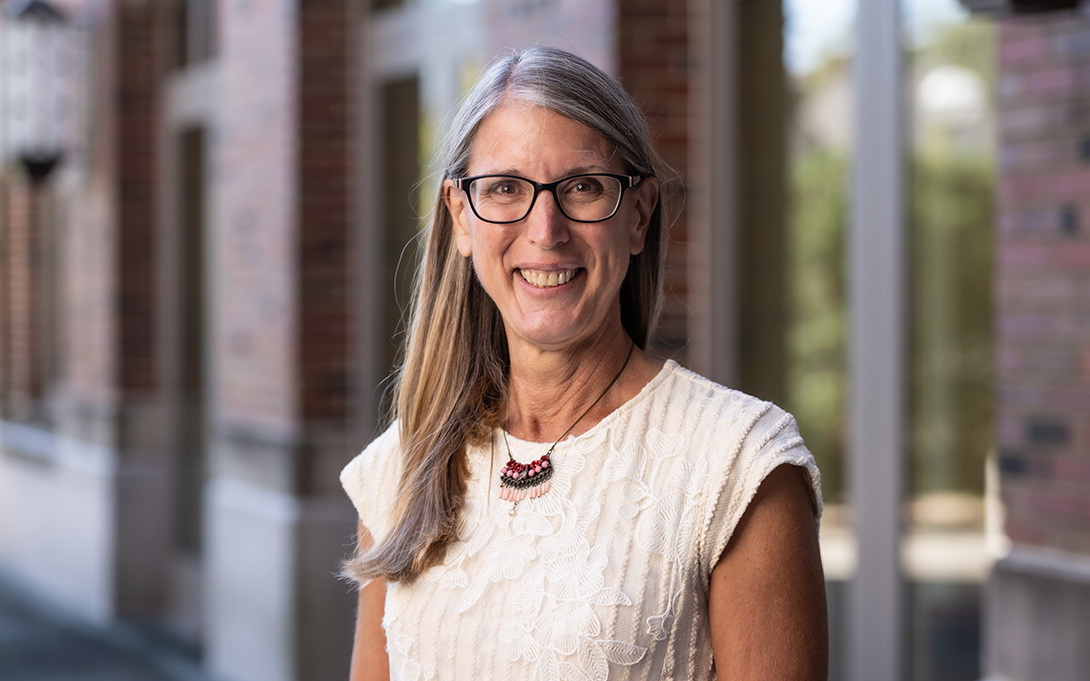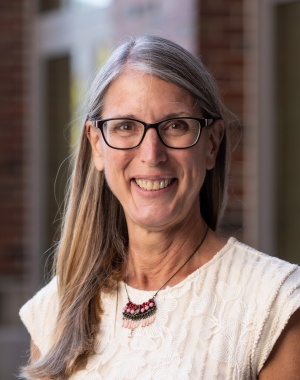
Kristin Seefeldt has been named acting faculty director of Poverty Solutions at the University of Michigan for the 2024-25 academic year while inaugural faculty director Luke Shaefer is on sabbatical.
Seefeldt, who has served as associate faculty director of Poverty Solutions since 2019, has established a national reputation for her contributions to U-M’s poverty research agenda over the past three decades. She was a researcher on a number of U-M studies of welfare reform conducted during the late 1990s and early 2000s. From 2004 to 2010, she was assistant director of the National Poverty Center, when U-M hosted the federally-funded research center that preceded Poverty Solutions, which launched as a presidential initiative in 2016.
An associate professor of social work and public policy, Seefeldt holds an MPP and a PhD in sociology and public policy from U-M. Seefeldt is the principal investigator administering and studying Guaranteed Income to Grow Ann Arbor (GIG A2), an innovative guaranteed income pilot providing monthly payments of $528 to 100 low-income entrepreneurs and gig workers in Ann Arbor in 2024 and 2025. She also is part of the research team for the Community Tech Workers program in Detroit. Seefeldt’s overall research agenda is focused on how policy and economic changes affect people’s everyday lives.
“I am enthusiastic about the future outlook of the Poverty Solution initiative, and I am looking forward to working with Professor Seefeldt as its acting director. Her professional track record places her in a unique position to lead this initiative to new levels of growth and engagement,” said Valeria Bertacco, vice provost for Engaged Learning at U-M, which oversees Poverty Solutions.
Seefeldt steps in for Shaefer, who founded Poverty Solutions in 2016 and established its focus on action-based research, done in partnership with policymakers and community groups, to find new ways to prevent and alleviate poverty. Under Shaefer’s leadership, Poverty Solutions:
- Established a Detroit Partnership on Economic Mobility with the Detroit Mayor’s Office and Detroit community-based organizations to set an economic mobility agenda for the city;
- Informed the design of the 2021 expanded Child Tax Credit, which contributed to a record-low child poverty rate; and
- Partnered with Michigan State University to launch a first-of-its-kind citywide maternal cash assistance program in Flint called Rx Kids, which provides payments to people during pregnancy and the first year of the child’s life.
During his sabbatical, Shaefer will continue his role as principal investigator for Rx Kids, which recently received $20 million from Michigan’s Temporary Assistance for Needy Families (TANF) funds to expand to other communities across the state.
“Dr. Shaefer has done an incredible job of setting the initiative up for success prior to his sabbatical. I’m excited to work more closely with Dr. Seefeldt over the year ahead to leverage her unique experience and expertise to carry out our mission,” said Julia Weinert, managing director of Poverty Solutions.
In this Q&A, Seefeldt shares more about her vision for Poverty Solutions this year and the ways campus units and community partners can get involved in advancing efforts to prevent and alleviate poverty.
You’ve been contributing to poverty research at U-M for three decades. What makes the current iteration of Poverty Solutions unique in its approach to poverty scholarship?
Seefeldt: U-M has long been known for its pioneering research on issues affecting people with low incomes. For example, the Panel Study of Income Dynamics (PSID), launched at the Institute for Social Research in the 1960s and continuing today, is an important dataset for understanding families’ economic well-being. The work I did with Sheldon and Sandra Danziger and former Ford School Dean Rebecca Blank provided key insights into the effects of a very major policy change – welfare reform – on families with low incomes. All of this work was definitely policy relevant, and U-M poverty researchers have always looked for opportunities to inform policymakers about our work, but the work was usually researcher-driven, based on questions we found interesting and worthwhile to pursue. And, the primary product was often a book or journal article, both of which have great value but are often inaccessible to those outside of academia.
Poverty Solutions, though, uses a community-driven approach in generating the topics and issues that we study. We work collaboratively with community partners and policymakers to identify the questions that need answering. We also look for ways to make changes to policies and systems – that is the central goal of our work.
What projects are you most excited about for the coming academic year?
Seefeldt: I’m excited to continue working on the GIG A2 research. Last year we were really focused on getting the pilot up and running. Now we have the opportunity to dig into the data we’ve collected, both from surveys and interviews, to learn more about the program participants, the issues affecting their lives, and the ways they use their guaranteed income payments.
I’m also excited to get to know more about the projects in which I haven’t been as deeply involved and learning from our staff.
How can people get involved in supporting Poverty Solutions’ work?
Seefeldt: Our communications team does an excellent job at keeping our website, poverty.umich.edu, up to date with the latest news related to our work. People can also join the list to receive newsletters. Every fall we host a speakers series on campus, featuring leaders in the field who are doing innovative work. Those talks begin on Sept. 27, running every Friday through Nov. 8. If you can’t attend in person, a livestream will be available.
